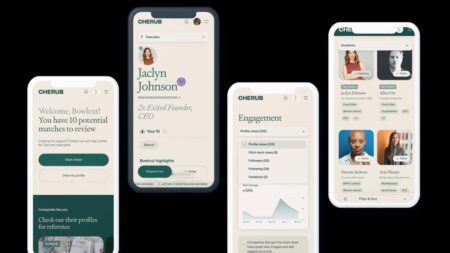TigerEye CEO Tracy Young and her husband and CTO Ralph Gootee helped build their previous startup, PlanGrid, into a $100 million ARR business before selling it to Autodesk for $850 million in 2018. Yet in spite of that success, they always felt they left business on the table because of an inability to forecast business changes accurately.
After leaving PlanGrid in 2020, the couple was thinking about what to do next, and they kept coming back to this business forecasting problem. They decided to launch a company and build a product they wished that they had back in the PlanGrid days, and the result is TigerEye, a company that is emerging today.
“TigerEye is a business simulation engine that helps companies predict their future,” Young told TechCrunch. So if you are going to alter territories, hire more or fewer people or change sales quotas, as a few examples, you can test drive your plan first before you present it to your board or your team, and have a sense of how these moves will impact the business.
She pointed out the irony that PlanGrid was trying to help the construction industry go paperless by putting construction plans on an iPad, yet she was printing out Salesforce reports every week to track the progress of her business. At the same time, she was getting spreadsheets from her analysts, but she says at best, spreadsheets are two dimensional views of a business. Gootee believed that the way around those limitations was by creating intelligent simulations that behaved like ‘What If’ scenarios in financial planning software.
He knew about simulations from his prior work at Johns Hopkins doing work simulating ballistic missile attacks. While business is different from missile defense, he could still apply some of the lessons learned. “We felt very strongly about simulations being the future of business, and I think we were just waiting for someone to build it – and then suddenly, it’s 2020 — and our time got freed up because we left Autodesk. So we started really thinking about if we were going to be the ones that built this out – and then we did it,” she said.
The couple was advising other startups at Y Combinator in 2021 when they decided it was time to build TigerEye. The following year, they brought a bunch of the core members of the PlanGrid team back together and started working on the problem. She said it took two years to build as its a complicated solution. Over that time, they worked with a design review board they assembled along with design partners to refine the solution. Young sees generative AI as a natural fit for this solution – being able to ask questions of the data – and that is on the drawing board.
As a husband and wife founding team with three young children, it’s not easy to maintain a work-life balance, but Young says she and her husband carve out work time and family time and try not to let one bleed into the other to maintain the proper focus for both the family and the company. She doesn’t pretend that it’s not hard, but she says they are an example that it’s possible.
“We have heavily protected work time, and heavily protected family time. And one of our core values at TigerEye is being wholehearted, which means that I expect this from everyone in the company. It’s like when you’re at work, be at work,” she said. She says during the day when they’re at work, they have others who are responsible for the kids, but at night the couple fiercely protects dinner time as family time. She says that after the kids are in bed, they still have to agree whether it’s OK to talk about work. “We have to both agree to talk about work where we gauge, are we talking about work? OK, we’re talking about work.”
It seems to be working so far, and investors believe in them. If investors love one thing, it’s an experienced founding team, and they were able to raise $35 million from Y Combinator, Initialized Capital and Next47.
Read the full article here








